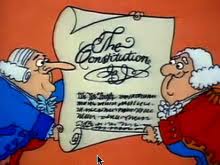The Constitution

The Constitution
Friday, December 17, 2010
Crossing the Delaware!
Wednesday, December 15, 2010
Power of the Individual in History

The Big Idea for the day: Impact of Individuals
Enduring Understanding: Decisions and actions of individuals can influence the outcome of an event.
As we study the Revolutionary War, it is important that we recognize the contributions of individuals in winning American independence. Your assignment today should help you take a step in that direction! Read the task and follow the procedure below. You may type your assignment, or write on a piece of lined notebook paper.
Task:
Find 5 people you believe had an effect on the outcome of the American Revolution.
If you are at home today, you should pick just one person and be prepared to hand in your work tomorrow.
Procedure:
Using a textbook or computer, find 5 individuals who may have influenced the outcome of the American Revolution.
For each individual, write a description of the person, what he/she did that was important, and why you believe their action or actions made a difference.
Write a "what if this person had never lived" scenario for each individual.
Example:
Thomas Gage- Governor/General of Massachusetts. He was sent to place Massachusetts and Boston under martial law after the Boston Tea Party. Parliament instructed him to put down the growing rebellion, but his actions (attempt to capture guns at Concord) led to the death of 8, and many more wounded Colonists at the Battle of Lexington. The Battle of Lexington helped to unite Colonists against England. More than ever, they would view the British Army as an invading force.
Thomas Gage's decision to make a frontal assault at the Battle of Bunker Hill led to yet another British military disaster. Over 1,000 Redcoats were killed or wounded, convincing Americans that it was possible to successfully fight against the more experienced, better trained British soldiers.
Scenario:
If Thomas Gage had never lived, perhaps the Governor/General of Massachusetts would not have attempted to capture the guns at Concord, and the Battle of Lexington might not have happened. If the Battle of Lexington had not occurred, the Battle of Bunker Hill would not have happened, and the Colonists may have continued to believe that it was impossible to stand up against the powerful British Army.
Tuesday, December 14, 2010
Washington takes charge!
To watch the video we are watching in class today, look below:
Monday, December 13, 2010
The Revolutionary War begins
Friday, December 10, 2010
Declaration of Independence Quiz
Thursday, December 9, 2010
Declaration of Independence review
Complete the following activities:
Rags to Riches
http://www.quia.com/rr/750706.html
Signer word search
http://www.apples4theteacher.com/word-finds/declaration-of-independence.html
Pop-up paragraph
http://www.quia.com/cz/404998.html
Declaration of Independence Jumbled Words Activity
http://www.quia.com/jw/425820.html
Film about the Declaration of Independence:
http://www.earlyamerica.com/independence.htm
Wednesday, December 8, 2010
Declaration of Independence

Declaration of
Each student (or group) will have a copy of the Declaration of Independence. You will use the method for reading documents in your analysis. I will review with you the first two steps in analyzing the document. For the third step or reading, answer the questions below. You may write directly on the Declaration, in your notes, or on a separate sheet of paper.
Part I: As Individuals Declaration of Independence
1. On the document underline the following and letter your answer starting at the first word of the answer:
a. What is the purpose of the Declaration? (paragraph 1)
b. What three natural or unalienable rights do men have? (paragraph 2)
c. Governments get their power from whom? (paragraph 2)
d. What must people do if government abuses its power? (paragraph 2)
2. On the Declaration, number the grievances found. (Hint: there are twenty-eight.)
3. Underline the "action" part of the document. (What are the signers going to do?) (last paragraph)
4. Place brackets around the part that shows the compact or pledge of the signers. (last paragraph)
Part II: In a Group:
1. In your groups, discuss why the grievances are actually the causes of the Revolution.
2. On a separate sheet of paper entitled "Causes of the Revolution," the group should list ten of the causes of the American Revolution.
3. Put a star next to the three causes your group feels were the most important. At the bottom of the page justify why the group chose these causes. Hand in your group assignment by the end of the period.
Tuesday, December 7, 2010
Revolutionary Ideas: John Locke and Thomas Jefferson
Monday, December 6, 2010
Causes of the American Revolution Test
When finished with the test, read a book, or work on an assignment from another class.
Good Luck! If you studied, you will do well.
Friday, December 3, 2010
Test Review
A great way to practice for the test is to play the formative assessment games.
Items on the test:
proclamation of 1763
French and Indian War
Sugar Act
Stamp Act
Quartering Act
Navigation Acts

Boston Massacre
Tea Act
Sons of Liberty
Boston Tea Party
"No taxation without representation"
King George III
English Bill of Rights
Intolerable Acts
Battles of Lexington and Concord
boycott
import
export
writ of assistance
Thomas Gage
martial law
Samuel Adams
Paul Revere
minutemen
"Shot heard 'round the world"
patriot
loyalist
whig
tory
Thursday, December 2, 2010
Letter for Reconciliation
King George III with three goals in mind:
1. Explain how the Battle of Lexington and Concord happened.
2. Justify the actions of the Colonists (give 3 causes)
3. Ask that the Colonists not be punished for their actions.
The letter is due tomorrow at the beginning of the period, along with the movie journal.


